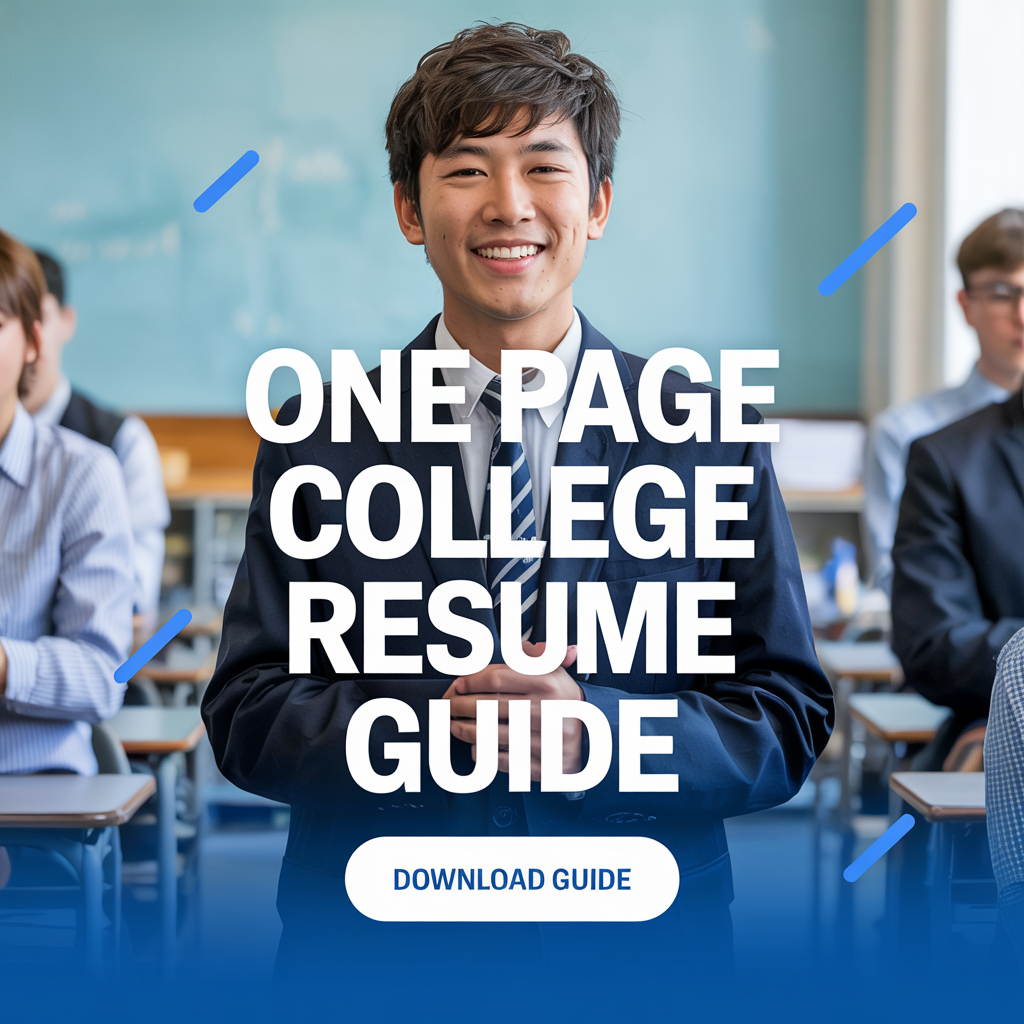The One-Page Resume Rule: When to Break It (and How) for College Applications

You’ve probably heard the golden rule: keep your resume to one page. For most job applications and many college applications, this is excellent advice. But is the one page resume college rule unbreakable? Not always. There are specific situations, especially in academia and the arts, where a resume longer than one page might be appropriate, or even necessary, for high school students applying to college. Let’s explore when breaking the rule makes sense and how to do it correctly. You can find helpful resources for building your resume at Cirkled in.
The Standard Advice: Keep Your College Resume to One Page
For the vast majority of high school students applying to undergraduate programs, sticking to one page is the way to go. Admission officers read thousands of applications. They appreciate concise, focused information that quickly highlights your key achievements and experiences relevant to being a successful college student.
Why is One Page Usually Recommended?
- Readability: A single page is quick and easy to scan.
- Focus: It forces you to prioritize your most important accomplishments.
- Relevance: Prevents including less relevant or weaker experiences just to fill space.
- Standard Practice: It’s the expected format in most professional and early academic contexts.
Unless you have truly exceptional circumstances, aim for one page.
When Might a Longer Resume Be Acceptable (or Even Preferred)?
There are a few specific scenarios where a longer resume college application might be justified:
Extensive Research Experience
If you have participated in significant, multi-year research projects (e.g., at a university lab, through a prestigious science program), resulting in substantial contributions, you might need more space to detail your work, techniques used, and any resulting abstracts or posters.
Significant Publications or Presentations
If you have co-authored peer-reviewed publications or presented research at regional or national conferences (beyond a standard school science fair), listing these requires space and is highly relevant, especially for research-focused programs.
Substantial Arts Portfolios/Experience (Arts Supplements)
Students applying to competitive arts programs (music, theater, visual arts, dance) often submit an arts supplement resume or portfolio. This specific resume might need more space to list performances, exhibitions, roles, repertoire, training, and awards in detail, as required by the program. It focuses almost entirely on artistic achievements.
Applying to Graduate-Level or Combined Programs
If applying directly to a combined BS/MD or other accelerated graduate-level program, the expectations might lean closer to a graduate school application, potentially allowing for a more detailed (longer) resume resembling a CV. Check program guidelines.
Specific Program Requirements (CV Request)
Rarely, a specific undergraduate program or scholarship might explicitly ask for a Curriculum Vitae (CV) instead of a resume. A CV is typically longer and more comprehensive, especially regarding academic achievements. You can explore resume templates and guidance at Cirkled in.
CV vs. Resume in High School/College Context
Generally:
- Resume: A concise summary (usually 1 page) of skills, experiences, and education, tailored to a specific purpose. Focuses on brevity and relevance.
- Curriculum Vitae (CV): A more detailed, comprehensive listing of one’s entire academic and professional history. Often multiple pages. Common in academia, science, medicine. Includes publications, presentations, research, teaching experience, etc.
For most high schoolers, the distinction isn’t critical, but if asked for a CV, understand it implies more detail is acceptable, especially academic detail. Thinking about CV vs resume high school usually means deciding if your academic/research achievements warrant exceeding one page.
How to Format a Longer Academic Resume/CV
If you genuinely need more than one page:
- Prioritize Ruthlessly: Even if longer, every item must still be highly relevant and impactful. Don’t just add filler.
- Clear Sections: Use clear headings (Education, Research Experience, Publications, Presentations, Performances, Awards, Skills, etc.).
- Consistent Formatting: Maintain clean fonts, spacing, and structure across all pages.
- Contact Info on Each Page: Include your name and page number (e.g., “Jane Doe – Page 2”) on subsequent pages.
- Focus on Achievements: Use bullet points with action verbs to describe accomplishments, not just duties. Use an academic resume format that highlights scholarly activities.
Important Caveats Before Going Over One Page
- Check Instructions: Always follow any specific instructions given by the college or program regarding resume length.
- Is it REALLY Necessary?: Be honest with yourself. Can you be more concise? Can less important items be cut? Ask a counselor or teacher for advice.
- Relevance is Key: More pages are useless if the content isn’t highly relevant and impressive. Quality over quantity always applies.
Final Thought: Prioritize Relevance and Readability
While the one page resume college guideline holds true for most applicants, don’t be afraid to go longer if you have substantial, highly relevant achievements (especially in research or the arts) that truly require the extra space and if program guidelines allow or imply it. Focus on making every single item count and ensure the document remains exceptionally clear, well-organized, and easy for the reader to digest, regardless of its length.
Need more tips on college applications, scholarships, or just how to survive this whole process? Cirkled In has your back—check out Cirkled In resources to help you through every step of your college journey!Check out Cirkled In and start owning your future today!



0 Comments